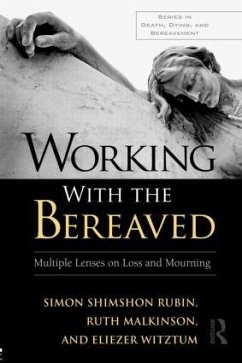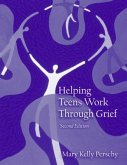Simon Shimshon Rubin (Israel University of Haifa), Ruth Malkinson (Israel Tel Aviv University), Eliezer Witztum (Israel Ben-Gurion University of the Negev)
Working with the Bereaved
Multiple Lenses on Loss and Mourning
Simon Shimshon Rubin (Israel University of Haifa), Ruth Malkinson (Israel Tel Aviv University), Eliezer Witztum (Israel Ben-Gurion University of the Negev)
Working with the Bereaved
Multiple Lenses on Loss and Mourning
- Broschiertes Buch
- Merkliste
- Auf die Merkliste
- Bewerten Bewerten
- Teilen
- Produkt teilen
- Produkterinnerung
- Produkterinnerung
Working With the Bereaved summarizes the major themes in bereavement research and clinical work and uses the authorsâ own cutting-edge research to show mental-health practitioners how to integrate these themes into their practice.
Andere Kunden interessierten sich auch für
![Continuing Bonds in Bereavement Continuing Bonds in Bereavement]() Continuing Bonds in Bereavement58,99 €
Continuing Bonds in Bereavement58,99 €![Techniques of Grief Therapy Techniques of Grief Therapy]() Techniques of Grief Therapy39,99 €
Techniques of Grief Therapy39,99 €![Helping Grieving People - When Tears Are Not Enough Helping Grieving People - When Tears Are Not Enough]() J. Shep Jeffreys (in private practice, Maryland, USA)Helping Grieving People - When Tears Are Not Enough68,99 €
J. Shep Jeffreys (in private practice, Maryland, USA)Helping Grieving People - When Tears Are Not Enough68,99 €![Third-Wave Cognitive Therapy for the Treatment of Loss and Grief Third-Wave Cognitive Therapy for the Treatment of Loss and Grief]() Faramarz HashempourThird-Wave Cognitive Therapy for the Treatment of Loss and Grief36,99 €
Faramarz HashempourThird-Wave Cognitive Therapy for the Treatment of Loss and Grief36,99 €![Gift of Tears Gift of Tears]() Susan LendrumGift of Tears53,99 €
Susan LendrumGift of Tears53,99 €![Helping Teens Work Through Grief Helping Teens Work Through Grief]() Mary Kelly PerschyHelping Teens Work Through Grief51,99 €
Mary Kelly PerschyHelping Teens Work Through Grief51,99 €![Love and Loss Love and Loss]() Colin Murray ParkesLove and Loss39,99 €
Colin Murray ParkesLove and Loss39,99 €-
-
-
Working With the Bereaved summarizes the major themes in bereavement research and clinical work and uses the authorsâ own cutting-edge research to show mental-health practitioners how to integrate these themes into their practice.
Hinweis: Dieser Artikel kann nur an eine deutsche Lieferadresse ausgeliefert werden.
Hinweis: Dieser Artikel kann nur an eine deutsche Lieferadresse ausgeliefert werden.
Produktdetails
- Produktdetails
- Series in Death, Dying, and Bereavement
- Verlag: Taylor & Francis Ltd
- Seitenzahl: 282
- Erscheinungstermin: 27. Oktober 2011
- Englisch
- Abmessung: 226mm x 152mm x 20mm
- Gewicht: 478g
- ISBN-13: 9780415881661
- ISBN-10: 0415881668
- Artikelnr.: 33689834
- Herstellerkennzeichnung
- Libri GmbH
- Europaallee 1
- 36244 Bad Hersfeld
- gpsr@libri.de
- Series in Death, Dying, and Bereavement
- Verlag: Taylor & Francis Ltd
- Seitenzahl: 282
- Erscheinungstermin: 27. Oktober 2011
- Englisch
- Abmessung: 226mm x 152mm x 20mm
- Gewicht: 478g
- ISBN-13: 9780415881661
- ISBN-10: 0415881668
- Artikelnr.: 33689834
- Herstellerkennzeichnung
- Libri GmbH
- Europaallee 1
- 36244 Bad Hersfeld
- gpsr@libri.de
Simon Shimshon Rubin is professor of clinical psychology and director of the International Center for the Study of Loss, Bereavement and Human Resilience at the University of Haifa in Israel. Chairman of the Postgraduate Program in Psychotherapy, he has lectured and published extensively on bereavement, ethics, and psychotherapy. Ruth Malkinson is adjunct senior lecturer at the Bob Shapell School of Social Work at Tel Aviv University. She is the director of the Israeli Center of REBT. She is internationally recognized for her expertise in cognitive grief therapy and is the author of Cognitive Grief Therapy: Constructing a Rational Meaning to Life Following Loss (2007). Eliezer Witztum is professor in the Division of Psychiatry, Faculty of Health Sciences at Ben-Gurion University of the Negev. He is director of Psychotherapy Supervision at the Mental Health Center, Beer Sheva, and senior psychiatrist at the Community Mental Health Center of Ezrat Nashim Hospital in Jerusalem. A prolific writer, he has written more than 200 scientific publications and 10 books. The authors have been writing together for many years and have published Loss and Bereavement in Israel and Traumatic and Nontraumatic Loss and Bereavement as well as numerous articles.
Part I: Choosing Life After Loss. Love - and Loss - and Life. Current
Perspectives on Bereavement. Part II: The Two-Track Model of Bereavement:
Continuing Bonds and
Continuing With Life. Introduction to the Theory and Clinical Applications
of the Two-Track Model of Bereavement. Clinical Theory and Practice at the
Interface of Trauma and
Bereavement. The Relational Traumas of Bereavement. Therapeutic Work With
the Relationship to the Deceased. Part III: Integrating Various Therapeutic
Approaches With Insights From the Two-Track Model of Bereavement.
Psychodynamic Psychotherapy: Traditional and Relational Aspects of the
Encounter. A Cognitive Behavior Approach: Rational Emotive Behavior
Therapy. Cognitive Therapy: Applying Imagery and Mindfulness. Strategic
Integrative Interventions: Applying Letter Writing, Leave-taking Rituals,
and Metaphor. Systemic Family Grief Therapy. Part IV: Expanding Horizons:
Culture, Clinical Challenges, and Facilitating Resilience. The
Social-cultural Contexts of Loss: Considerations for Culturally Sensitive
Interventions. Emergencies in Complications Following Loss. Growth and
Resilience: Considerations for Clients and Therapists. Appendix: The
Two-Track Bereavement Questionnaire (TTBQ2-70) 227.
Perspectives on Bereavement. Part II: The Two-Track Model of Bereavement:
Continuing Bonds and
Continuing With Life. Introduction to the Theory and Clinical Applications
of the Two-Track Model of Bereavement. Clinical Theory and Practice at the
Interface of Trauma and
Bereavement. The Relational Traumas of Bereavement. Therapeutic Work With
the Relationship to the Deceased. Part III: Integrating Various Therapeutic
Approaches With Insights From the Two-Track Model of Bereavement.
Psychodynamic Psychotherapy: Traditional and Relational Aspects of the
Encounter. A Cognitive Behavior Approach: Rational Emotive Behavior
Therapy. Cognitive Therapy: Applying Imagery and Mindfulness. Strategic
Integrative Interventions: Applying Letter Writing, Leave-taking Rituals,
and Metaphor. Systemic Family Grief Therapy. Part IV: Expanding Horizons:
Culture, Clinical Challenges, and Facilitating Resilience. The
Social-cultural Contexts of Loss: Considerations for Culturally Sensitive
Interventions. Emergencies in Complications Following Loss. Growth and
Resilience: Considerations for Clients and Therapists. Appendix: The
Two-Track Bereavement Questionnaire (TTBQ2-70) 227.
Part I: Choosing Life After Loss. Love - and Loss - and Life. Current
Perspectives on Bereavement. Part II: The Two-Track Model of Bereavement:
Continuing Bonds and
Continuing With Life. Introduction to the Theory and Clinical Applications
of the Two-Track Model of Bereavement. Clinical Theory and Practice at the
Interface of Trauma and
Bereavement. The Relational Traumas of Bereavement. Therapeutic Work With
the Relationship to the Deceased. Part III: Integrating Various Therapeutic
Approaches With Insights From the Two-Track Model of Bereavement.
Psychodynamic Psychotherapy: Traditional and Relational Aspects of the
Encounter. A Cognitive Behavior Approach: Rational Emotive Behavior
Therapy. Cognitive Therapy: Applying Imagery and Mindfulness. Strategic
Integrative Interventions: Applying Letter Writing, Leave-taking Rituals,
and Metaphor. Systemic Family Grief Therapy. Part IV: Expanding Horizons:
Culture, Clinical Challenges, and Facilitating Resilience. The
Social-cultural Contexts of Loss: Considerations for Culturally Sensitive
Interventions. Emergencies in Complications Following Loss. Growth and
Resilience: Considerations for Clients and Therapists. Appendix: The
Two-Track Bereavement Questionnaire (TTBQ2-70) 227.
Perspectives on Bereavement. Part II: The Two-Track Model of Bereavement:
Continuing Bonds and
Continuing With Life. Introduction to the Theory and Clinical Applications
of the Two-Track Model of Bereavement. Clinical Theory and Practice at the
Interface of Trauma and
Bereavement. The Relational Traumas of Bereavement. Therapeutic Work With
the Relationship to the Deceased. Part III: Integrating Various Therapeutic
Approaches With Insights From the Two-Track Model of Bereavement.
Psychodynamic Psychotherapy: Traditional and Relational Aspects of the
Encounter. A Cognitive Behavior Approach: Rational Emotive Behavior
Therapy. Cognitive Therapy: Applying Imagery and Mindfulness. Strategic
Integrative Interventions: Applying Letter Writing, Leave-taking Rituals,
and Metaphor. Systemic Family Grief Therapy. Part IV: Expanding Horizons:
Culture, Clinical Challenges, and Facilitating Resilience. The
Social-cultural Contexts of Loss: Considerations for Culturally Sensitive
Interventions. Emergencies in Complications Following Loss. Growth and
Resilience: Considerations for Clients and Therapists. Appendix: The
Two-Track Bereavement Questionnaire (TTBQ2-70) 227.








